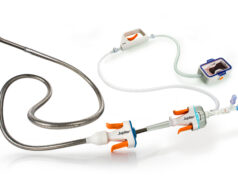
Clinical work and data will be presented on Humacyte’s novel bioengineered blood vessel at the 27th International Symposium on Endovascular Therapy (ISET, 31 January–4 February, Hollywood, USA).
Jeffrey H Lawson, vice Chair for Research, Professor of Surgery and Pathology at Duke University Medical Center, Durham, USA, will present a keynote lecture titled “Bioengineering and the potential to create new blood vessels” at ISET.
Lawson, who is also director of the Vascular Research Laboratory, director of Clinical Trials for the Department of Surgery and clinical consultant to Humacyte, will discuss early stage development and clinical testing of Humacyte’s off-the-shelf human bioengineered blood vessel replacement that is being developed for key applications in regenerative medicine and vascular surgery.
“More than 400,000 haemodialysis patients with end stage renal disease suffer from yearly surgical procedures having to do with graft complications,” said Lawson. “Through advances in tissue engineering, we can potentially access non-living, immunologically tolerated blood vessels for implantation that might allow us to reduce number of interventions. This prospective alternative to the current standard of care has the potential to be a significant game-changer for patients.”
Humacyte’s bioengineered blood vessel is cultivated with donated human cells on a tubular scaffold, and then decellularised to allow for allogeneic, off-the-shelf investigational use. The bioengineered blood vessel has performed better than other synthetic and animal-based implants in pre-clinical tests. The product received ‘Fast Track’ designation in 2014 from the US FDA for vascular access in patients with end stage renal disease requiring haemodialysis, expediting the regulatory review process.










